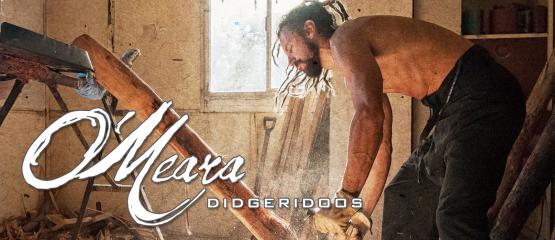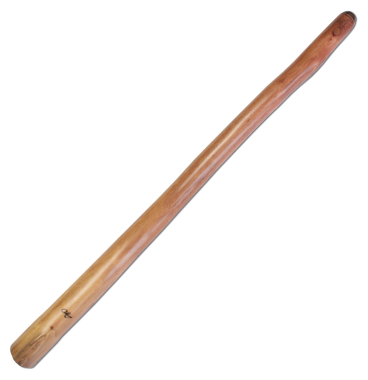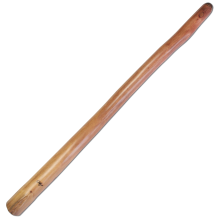Tristan O'Meara 94
Why is this didg takes part of the Selection Gauthier Aubé? In addition to being a long-time friend, Gauthier is in my eyes one of the most inspiring musicians on the current didgeridoo scene. It was therefore quite natural that I proposed to him to collaborate on a selection of instruments.
The idea is simple: Gauthier chooses and recommends didgeridoos of didgeridoo-passion that he particularly likes. Each selected didgeridoo corresponds to its requirements: balance, playing comfort, sound richness, precision... Gauthier is recognized for his technical insight but also for his pedagogical approach, which makes him an excellent guide for all enthusiasts looking for a good instrument! For each model in this selection, you will find a video of Gauthier playing it and his commentary, so you can hear his potential and better feel what he has to offer.
Comments from Gauthier : What stands out here is the sharpness of the harmonics. The sound is tight yet retains roundness it’s in C, with a well-opened bore and beautifully distinct overtones. A great choice for meditative playing, but it also works well for rhythm.
My comments: All Tristan didges are made by hand with the help of a few power tools for sanding and polishing. They are coated inside and out with a blend of natural wood oils. Soaked for 24 hours, in order to saturate the wood and thus accentuate the natural colors but also to penetrate deep into the fibers of the wood in order to harden and crystallize it, which increases the density of the wood and the quality of sound in the instrument. They are then finished externally with multiple layers of high quality, UV resistant and flexible epoxy resin. Each didgeridoo has a wooden mouthpiece crafted to the dimensions of the instrument. Perfectly made, internal diameter, size and finish.
I asked Tristan for the last batch to get me out of the didgeridoos with a more open column by asking him for a column ratio less or closer to 2 (definition of the ratio in the tab characteristics). The three instruments 94, 95 and 96 are part of it! This gives low pressure didgeridoos, with a resonant and soft sound, ideal for harmonics, meditative play and wobbles.
- Instrument guaranteed for 1 year
- Shipping costs are free! (only for France)
- Didgeridoo Passion also offers you the carrying case
Classification
This scale is the result of an air column/bell start ratio If we divide the diameter of the bell with that of the beginning of the air column we get a number between 1.5 and 3.5. We can classify all the didgeridoos in 4 large families. Each family groups the instruments with a similar character, simply based on the overall shape of the air column (conical/cylindrical) and on the diameter of the column (wide/narrow). The result is a simple and very reliable reading grid, making it easier to search and purchase on line.
The diameters are measured with a caliper, start of the air column after the mouthpîece. This ratio is very reliable for a didg having a air column with a 'smooth' internal work, in the case of a hollowed eucalyptus instrument it give an approach of the instrumental character.

Tristan O'Meara
A musician at heart, Tristan has been making didgeridoos for over 10 years.
What started as a hobby became his livelihood: Making didgeridoos of the highest quality.
Who is Tristan O'Meara?
My name is Tristan O'Meara, and I've been a musician and songwriter for over 10 years. I currently live in Byron Bay, Australia. I was fortunate enough to be introduced to the didgeridoo by Wuduri Wiriundjara, a renowned Aboriginal artist from the Cairns area. Over time, I've learned what each player needs and their different styles on a didgeridoo. For those who want to perform on large stages, play outdoors or indoors, play solo acoustically, record in a studio, perform street art, or travel, I do my best to find what's best suited to each player. All my instruments are made using the finest eucalyptus wood (those that don't suit me end up as firewood; they burn very well...). Each didgeridoo is crafted and sculpted; I listen carefully to its optimal resonance. When I was learning didgeridoo techniques, I was searching for different notes to suit my music, but I couldn't afford to buy them all. So I decided to travel to the New Zealands.
I was fortunate enough to meet several traditional landowners who showed me how to make and how to find good logs properly hollowed out by termites in the Australian bush. These people were kind enough to share their time, skills, and knowledge with me. It was a long and often very difficult task that lasted several years. Over the last ten years, I have made didgeridoos with Aboriginal people as well as for renowned didgeridoo makers. I have spent countless hours perfecting my techniques for crafting these beautiful instruments, retaining everyone's ideas and improving my technique day after day.
How does Tristan make his didgeridoos?
All my dodges are 100% handmade from start to finish, crafted with the aid of a few power tools for sanding. They are coated inside and out with a blend of natural wood oils and left to soak for 24 hours. This saturates the wood, enhancing its natural colors and penetrating deep into the wood fibers to harden and crystallize it, increasing the wood's density and the instrument's sound quality. Finally, they are finished on the outside with several coats of high-quality, UV-resistant, and flexible epoxy resin.

